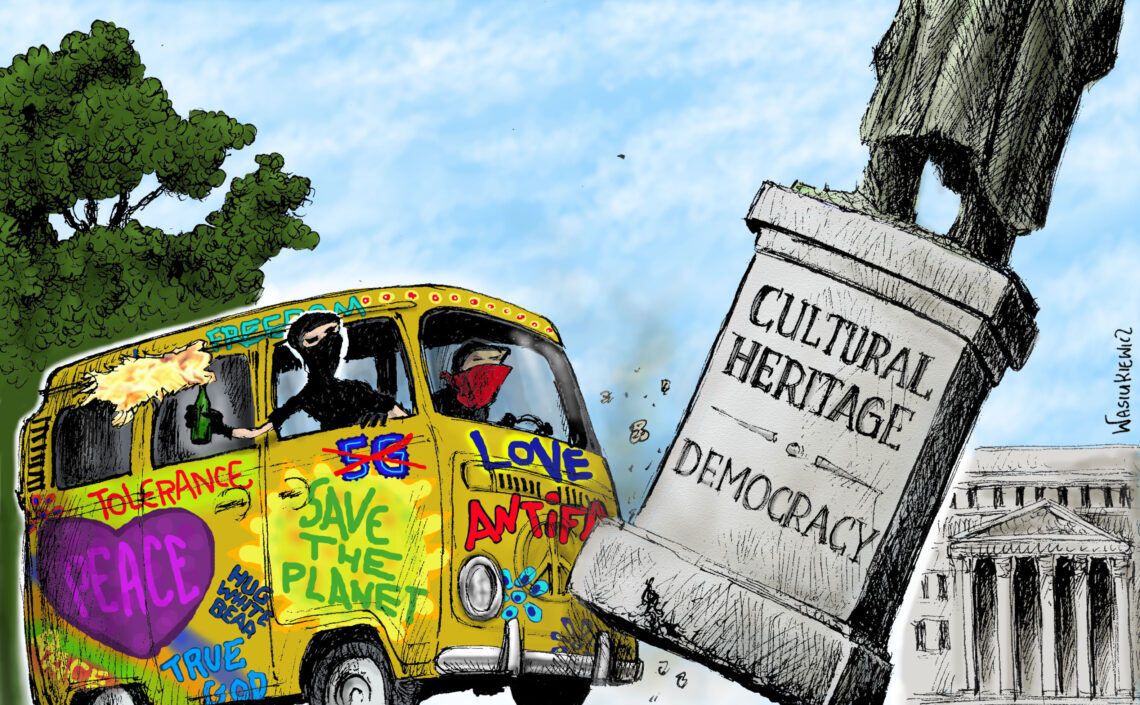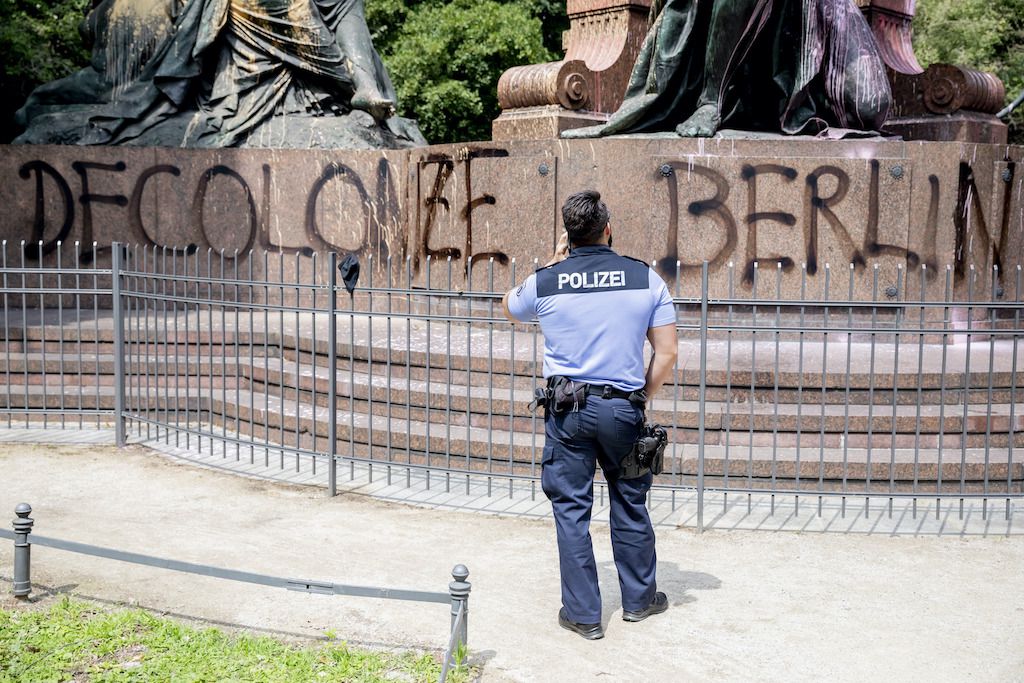Iconoclasm and moral hypocrisy
Modern-day iconoclasm is urging activists to remove objects and symbols of Western civilization as part of moralistic campaigns. By doing so, they are falsifying history and attacking the very foundation of democracy.

Iconoclasm is a Greek word for a destroying a picture. Its use goes back to Byzantine Emperor Leo III (717-741), who banned religious images. Today, iconoclasm is represented by fanatics destroying objects of historical heritage for political or religious reasons.
In March 2001, Taliban leader Mullah Mohammed Omar ordered the blowing up of two monumental 6th-century statues of Buddha in Afghanistan’s Bamiyan Valley. This barbaric act of religious zealotry shocked the world and was rightly condemned. Today, however, many would refrain from criticizing such gestures for fear of offending the religious sensitivities of Islamists. The Bamiyan Buddhas’ destruction is unforgivable. The statues, sculpted in 507 and 544, predated Islam. At the time, Buddhism was the prevailing religion in the area.
‘Cancel culture’
In 1966, Mao Zedong launched a brutal and radical mass-scale operation in China to reshape the country’s perception of history. During a decade known as the Cultural Revolution, the Chinese Communist Party murdered hundreds of thousands of people and destroyed countless historical monuments and works of art. Iconoclasm, an expression of fanaticism, also exists today. Europeans and Americans tend to associate the phenomenon with the uncivilized past and faraway radical movements such as the Taliban or Maoists.
Such a ‘history’ can be considered a form of intellectual iconoclasm.
Many in the West forget that past events and cultural heritage must be understood within their historical framework, not judged by the norms, standards and beliefs of today. Unfortunately, our approach to the past has become increasingly judgmental: it mixes a hypocritical “benefit of hindsight” attitude with moral arrogance in assessing the events and personalities of bygone eras. Such a “history” becomes a political tool. It can be considered a form of intellectual iconoclasm.
A significant number of Western historians no longer analyze the past in its historical context. They would rather judge it using moral standards set by themselves. The intellectual base for this practice eerily resembles that applied by the Taliban in the bombing of the Buddha statues. For example, Europe’s historical secularism has been overinflated, prompting excessive criticism of the continent’s Christian heritage. The opposition to including a reference to God in the European constitution was iconoclastic in its radicalism. The more Europe denies its Christian past, the more radical groups will entrench themselves. Xenophobia can quickly become the norm and laicism could degenerate into fundamentalism and intolerance.
Eradicating heritage, regardless of whether one agrees or disagrees with it, tends to polarize societies. The so-called “cancel culture,” born from social media’s practice of banning nonconformists, is supported by lots of organizations and spreading in Western societies. The past is doctored or censored according to today’s view of what is proper and what is not.
Silly, sad and alarming
Radicals now vandalize monuments of Winston Churchill and Otto von Bismarck. Names of streets are being changed at the slightest perceived provocation. “Mohr” (Moor in English) is an old German word for an African, never meant or used as a derogatory term. It originates from the same root as the name of the African country Mauritania. Mohr is also a frequent family name in Germany. Nonetheless, the Berlin-Mitte district authorities and socialists in the city’s Senate intended to rename Mohrenstrasse because of supposed racist overtones. In fact, the origin of the street’s name is unknown. It predates the colonization of Africa.
The intolerance so manifest in social media is now infiltrating academia.
David Hume (1711-1776) was a Scottish Enlightenment philosopher, one of the most influential to write in English. His name will be eradicated from the facade of an Edinburgh University building – another manifestation of “cancel culture.” The university’s Equality and Diversity Committee has decided to rename the David Hume Tower as 40 George Square due to Hume’s perceived moral shortcomings.

Recently, we have seen several such examples. And the banned people were far from being mass murderers like Hitler, Stalin, Lenin, Mao Zedong or Pol Pot. Unfortunately, the intolerance so manifest in social media is now infiltrating academia, where political correctness weighs heavily on freedom of speech, opinion, teaching and the pursuit of knowledge. A free society thrives in an open and also controversial debate. Here, too, extreme intolerance is on the rise.
Not every opinion accused of being politically incorrect is inappropriate, radical or fascist. Unfortunately, some organizations – such as Antifa – see themselves as the police of public morals and apply practices toward their opponents that can only be described as degrading, undemocratic and even authoritarian. Their purpose is to silence dissenters and eliminate competing lines of reasoning from circulation.
Silencing dissenters
Radical groups in German universities are preventing certain lecturers from teaching. Economics Professor Bernd Lucke was one of the founders of the political party Alternative fur Deutschland (AfD), together with economist and politician Joachim Starbatty, and Hans Olaf Henkel, a former head of the Federation of German Industries. At its inception, the AfD was a purely economic party, critical of the euro (since it was created with a disregard for the Maastricht criteria).
A citizen ‘guilty’ of criticizing the euro was not allowed to speak.
Criticism is a fundamental democratic right. However, Chancellor Angela Merkel self-righteously declared the party anti-European and extremist because it dared to criticize the European Union’s common currency. The original AfD, with its modest financing, was moderately successful. The criticism coming from the federal government has allowed a noneconomic wing of the party to assume control. Consequently, Ms. Merkel now faces what she had always feared – namely, a party to the right of her Christian Democrats. AfD founders Lucke, Starbatty and Henkel were forced out of the party by leaders with a different agenda.
When Professor Lucke returned to his Hamburg University post last October, radical left groups disrupted and blocked his lectures. A citizen and democrat “guilty” of criticizing the euro was not allowed to speak. German academia became blind. There are many such examples as well, not only in Germany.
Emperor’s courage
Hate speech should not be tolerated, whether it comes from the left or the right. But who is to judge opinions? The term “denier” is used to brand those who do not blindly follow every aspect of mainstream opinion. We now have “coronavirus deniers” who refuse to succumb to Covid-19-related panic. A “climate denier” is someone condemned for harboring any doubts about such initiatives as the 2016 Paris Agreement – even if we know for a fact that the earth’s climate is in constant flux. The arrogance of the climate lobby lies in elevating certain forecasts – such as future global temperatures – to absolute dogma status, excluding all other possibilities. This does not mean that critics of this dogma ignore the problem of pollution or oppose emissions or waste control. However, there are many different ways of achieving such essential objectives.
“Cancel culture” eliminates freedom of opinion. At its worst, it also limits open-ended academic debate and instead, attempts to shepherd researchers toward certain results. Such tendencies are alarming as they could end independent scientific investigation. Advancing knowledge requires many different approaches to problems and an impartial verification of the results gathered. Debate and openness are indispensable parts of this process.
Aggressive opinions gnaw at the principles of democracy and liberty.
Iconoclasm betrays a lack of self-confidence. Many could learn from the courage of the Habsburg emperors. During the Napoleonic Wars (1803-1815), Austrians had to retreat from Vienna. Napoleon Bonaparte entered the Austrian capital and slept two nights in the Imperial Palace in Schonbrunn. To celebrate his short-lived triumph, the Corsican ordered his symbol, the Napoleonic Eagle, to be displayed on both sides of the entrance. When the Austrians returned, Emperor Francis I refused to remove the Eagles. He said they should stay as a reminder that anyone can experience defeat. They remain there to this day.
We are witnessing broad and radical movements attempting to change our understanding of Western history, European tradition and free society. Aggressive opinions, devoid of tolerance, moral truth and ethical sensitivity gnaw at the principles of liberty. This strategy smacks of early 20-century fascism. Unfortunately, neither the worlds of politics nor the media dare to sufficiently rebuke these movements.
